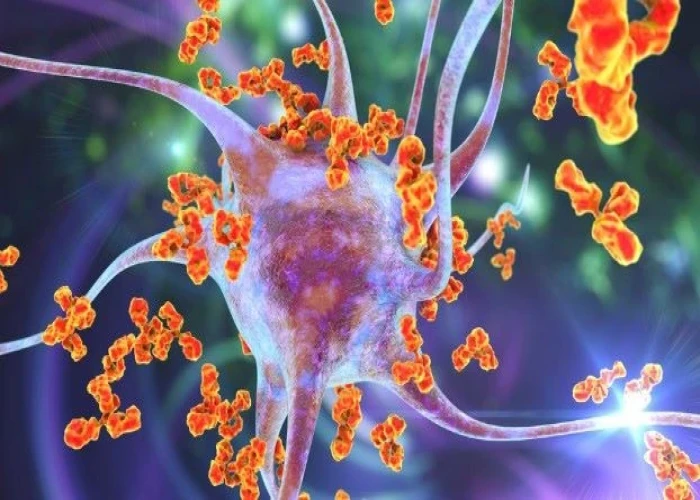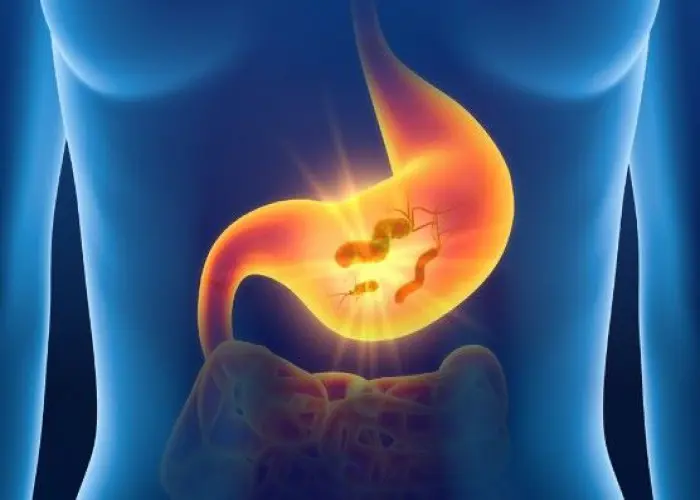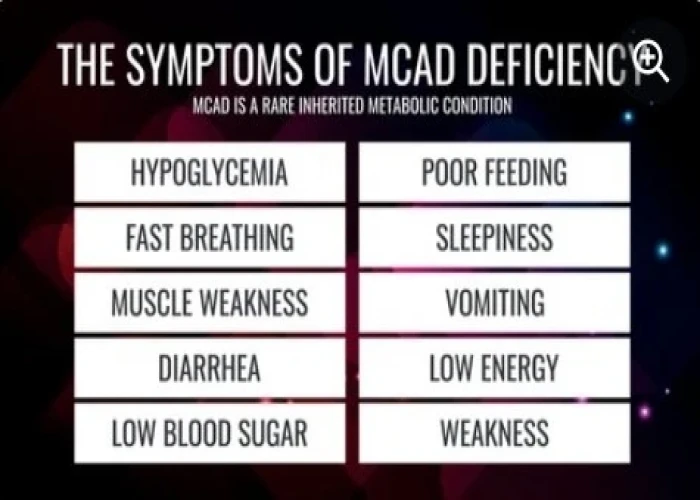 Welcome
Welcome
“May all be happy, may all be healed, may all be at peace and may no one ever suffer."
MCAD deficiency

MCAD (medium-chain acyl-CoA dehydrogenase) deficiency is an inherited metabolic disorder that affects the body's ability to convert certain fats to energy. It is caused by mutations in the ACADM gene, which provides instructions for making an enzyme that is necessary for the breakdown of medium-chain fatty acids.
Individuals with MCAD deficiency may not have enough of the MCAD enzyme to convert medium-chain fatty acids into energy, leading to a buildup of these fatty acids in the body. This can cause a variety of symptoms, including:
- Hypoglycemia (low blood sugar)
- Fatigue and weakness
- Vomiting and diarrhea
- Poor appetite and weight loss
- Liver dysfunction
- Enlarged heart (cardiomyopathy) and arrhythmias (irregular heartbeats)
- Seizures and coma
MCAD deficiency is typically diagnosed through newborn screening or genetic testing, and treatment involves preventing fasting and ensuring adequate energy intake through frequent feeding, a high-carbohydrate diet, and avoiding fasting for more than 4-6 hours. In some cases, supplementation with medium-chain triglycerides (MCT oil) may be helpful to provide a source of easily digestible energy.
It is important for individuals with MCAD deficiency to receive regular medical care and monitoring to prevent and manage potential complications. In addition, genetic counseling is recommended for affected individuals and their families to understand the inheritance pattern of the condition and the potential risks to their children.
Research Papers
Disease Signs and Symptoms
- Nausea or vomiting
- Decreased energy
- Low blood sugar (hypoglycemia)
- Diarrhea
- Viral infections and other illnesses
Disease Causes
MCAD deficiency
When you don't have enough of the MCAD enzyme in your body, certain fats called medium-chain fatty acids can't be broken down and converted to energy. This results in hypoglycemia and low energy. Also, fatty acids can build up in body tissues and cause damage to the liver and brain.
MCAD deficiency is inherited from both parents. Though both parents are carriers — each one has an abnormal gene — they typically don't have symptoms of the condition. The affected child inherits two copies of the abnormal gene — one from each parent.
If you inherit only one affected gene, you won't develop MCAD deficiency, but you are a carrier and can pass the abnormal gene to your children. But they wouldn't develop the condition unless they also inherited an affected gene from their other parent.
Disease Prevents
Disease Treatments
Newborn screening at birth allows MCAD deficiency to be diagnosed and treated early, before symptoms occur, preventing complications. Once identified, the disorder can be managed through diet and lifestyle.
The main goal of treatment for MCAD deficiency is to prevent problems caused by hypoglycemia from occurring. Infants with MCAD deficiency require frequent feedings with adequate calories from complex carbohydrates to maintain blood sugar and avoid hypoglycemia. Children and adults also require adequate complex carbohydrates on a regular schedule of eating. Work with your health care team, including a dietitian, to develop a treatment plan tailored to your childꞌs or your metabolic needs.
The length of time that is safe for fasting may vary with age and your health care teamꞌs recommendations. For example, during the first four months of life, well infants' fasting time may be no longer than four hours. Fasting time may be gradually increased up to 12 hours by one year of age. Children and adults should not fast for longer than 12 hours.
Recommendations to prevent hypoglycemia generally include:
- Avoid fasting longer than recommended by your health care team
- Eat regular meals and snacks with adequate calories from complex carbohydrates, such as brown bread, rice, pasta and cereal, for energy needs
- Choose foods that are high in complex carbohydrates and lower in fat
- Increase calories by eating extra complex carbohydrates during illness, stress or increased activity
Your health care team may recommend a carnitine supplement to aid in fatty acid metabolism.
Talk with your doctor about what to do if hypoglycemia signs and symptoms develop so that you have an emergency plan. Strategies may include:
- Taking simple carbohydrates, such as sugar (glucose) tablets or sweetened, nondiet beverages.
- Seeking emergency medical care if unable to eat or for diarrhea or vomiting. An intravenous (IV) line for extra glucose and additional treatment may be needed.
Disease Diagnoses
Disease Allopathic Generics
Disease Ayurvedic Generics
Disease Homeopathic Generics
Disease yoga
MCAD deficiency and Learn More about Diseases

Spontaneous coronary artery dissection (SCAD)

Hantavirus pulmonary syndrome

Paraneoplastic syndromes of the nervous system

Mouth cancer

Myofascial pain syndrome

Gastritis

Q fever

Salmonella infection
mcad deficiency, এমসিএডি ঘাটতি
To be happy, beautiful, healthy, wealthy, hale and long-lived stay with DM3S.
